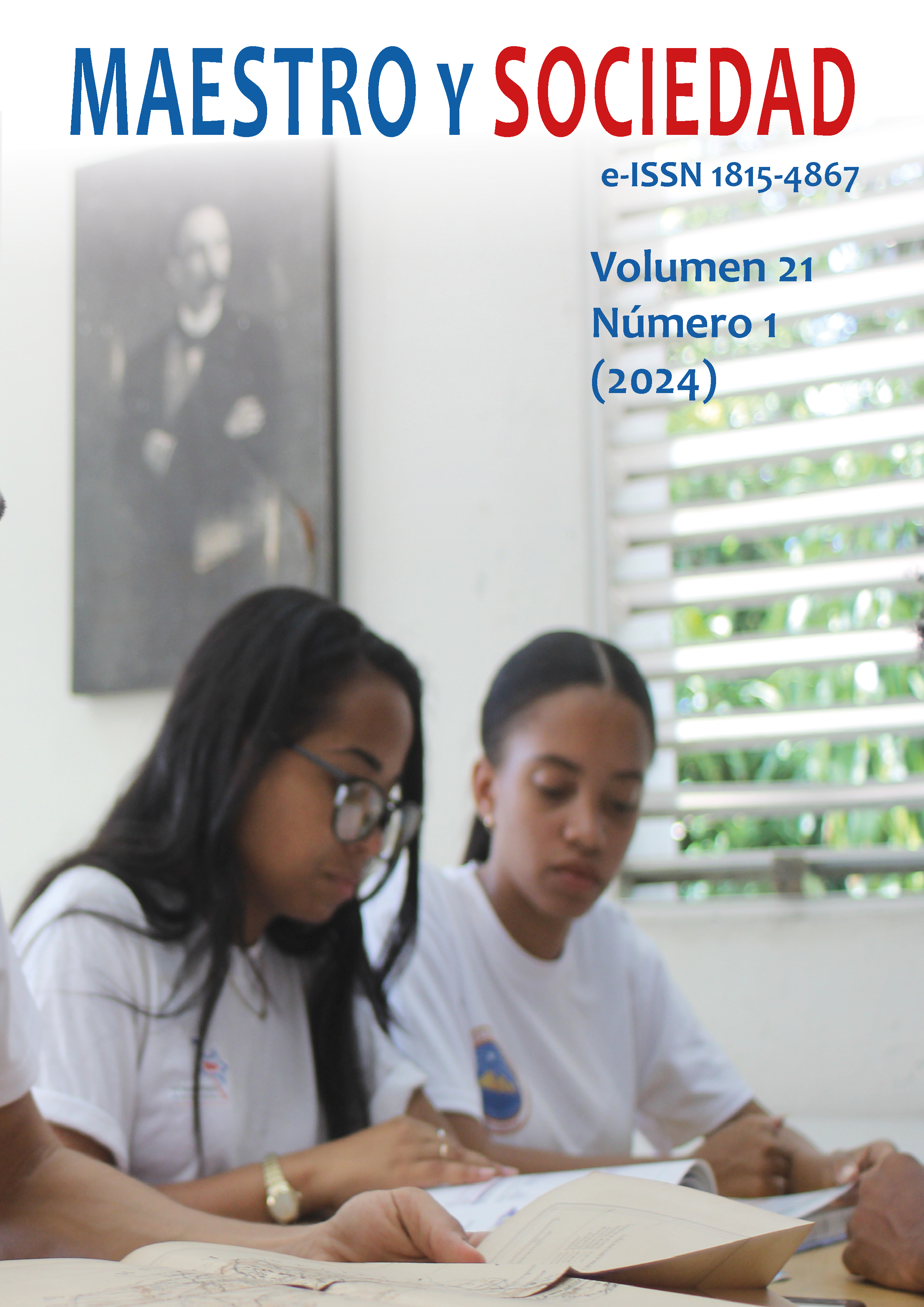Diagnosis of digital teaching skills in the university environment: a case study at the LusíadaUniversity of Luanda
Keywords:
ICT in education, blended learning, digital literacy, learning environments, teaching competenciesAbstract
This article addresses the detailed diagnosis of digital competencies of university teachers at the Lusíada University of Luanda, with the purpose of identifying insufficiencies in the integration of digital competencies in hybrid training environments. The study is conducted in a higher education institution in Angola; the exploratory diagnosis conducted in this specific context
reveals limitations in theteaching performance for the creative and transformative integration of digitization and virtuality in the training of these professionals. The methodology employed included quantitative and qualitative methods, such as observation of teaching performance and structured surveys, using as the main tool a questionnaire designed based on the Framework of teacher competencies in Information and Communication Technologies (ICT) proposed by UNESCO in 2019, selecting a representative sample of university teachers, with the purpose of assessing the degree of familiarization and application of these competencies in the professional performance of teachers. The results revealed significant variability in the correspondence of teaching practices with institutional and national policies in the pedagogical use of ICT. It was concluded that there is a need to implement training strategies and continuous support to strengthen teaching practices in this direction, in order to promote a more inclusive educational environment aligned with institutional and national policies.
References
Armijo, P. C., & Carvajal, C. M. (2018). Attitude to the Inclusion of Pedagogy Students of a Chilean State University. Revista Latinoamericana de Educación Inclusiva, 12(2).
Ávila González, C., Camarena Cadena, M. de J., & Belmonte Herrera, A. M. (2023). Las Redes Educativas Digitales en la construcción del aprendizaje social a lo largo de la vida. Comparativa de uso en pregrado y posgrado. Revista Iberoamericana de Tecnología En Educación y Educación En Tecnología, 33. https://doi.org/10.24215/18509959.33.e8
Bueno Gualan, P. A. Yanangomez Duchi, J. A., Neira Gavilanes, D. A., López Rodríguez, D. J., & Mesa Vazquez, J. (2023). Competencias para docentes de educación básica en la creación de contenidos educativos digitales en Ecuador. Revista Universidad y Sociedad, 15(5), 336–348. https://rus.ucf.edu.cu/index.php/rus/article/view/4082
Cicaré, A. (2019). ¿Hacia dónde van las políticas públicas en educación? Una mirada internacional y mercosureña. Rev. Secr. Trib. Perm. Revis., 7(14). https://doi.org/10.16890/rstpr.a7.n14.p295
De la Rosa Ruíz, D., Giménez Armentia, P., & Barahona Esteban, Á. (2022). Una propuesta educativa de formación integral desde la Universidad. Revista Prisma Social, 37.
Del RocioTixiCujilema, N., Paola Veloz Montenegro, C., Judith López Rodríguez, D., & Mesa Vazquez, J. (2023). Percepción de estudiantes sobre el uso de tecnologías digitales en las ciencias naturales en Ecuador. Universidad y Sociedad, 15(6).
Espinosa Izquierdo, J., Villamar Bravo, J. E., Quijije Acosta, K., & Mesa Vazquez, J. (2023). Applicability of emerging technologies in virtual learning environments. a look at the University of Guayaquil. Revista Internacional de Tecnología Ciencia y Sociedad, 15(1). https://doi.org/https://doi.org/10.37467/revtechno.v15.5098
García Aretio, L. (2021a). Can we trust evaluation in distance and digital education systems? RIED-Revista Iberoamericana de Educacion a Distancia, 24(2). https://doi.org/10.5944/ried.24.2.30223
García Aretio, L. (2021b). COVID-19 and digital distance education: pre-confinement, confinement and postconfinement. RIED-Revista Iberoamericana de Educacion a Distancia, 24(1). https://doi.org/10.5944/ried.24.1.28080
Garrido, M., & González, M. (2022). Evaluando la Política Educativa Básica: un impacto al ODS desde la reforma educativa para México. Alternancia, 4(6).
Landín Juárez, U. S. (2022). El aprendizaje colaborativo transdisciplinario (ACT) en la formación de formadores, una nueva perspectiva metodológica. Riaices, 4(1). https://doi.org/10.17811/ria.4.1.2022.9-15
Mesa Vazquez, J., Bonfante Rodríguez, M. C., Diaz Mendoza, M. A., Terán Palacio, E., & Velázquez labrada, Y. (2023). Criterios de calidad para la evaluación de ambientes virtuales de aprendizaje desde un enfoque docente. Universidad y Sociedad, 552–564.
Mesa Vázquez, J., Pardo Gómez, M. E., & Cedeño Marcillo, G. E. (2022). Informatics and informational competencies in scientific information management in postgraduate education. Estudios Pedagogicos, 48(2), 103–114. https://doi.org/10.4067/S0718-07052022000200103
Obando Correal, N. L., Palechor Ocampo, A. O., & Arana Hernández, D. M. (2018). Presencia docente y construcción de conocimiento en una asignatura universitaria modalidad b-learning. Pedagogía y Saberes, 48. https://doi.org/10.17227/pys.num48-7371
Plata Rangel, Á. M., Holguín Aguirre, M. T., Saénz Zapata, O., & Callejas Restrepo, M. M. (2023). Agenda 2030 y Objetivos de Desarrollo Sostenible: aportes de las instituciones de educación superior en la dimensión ambiental. Educación y Educadores, 25(2). https://doi.org/10.5294/edu.2022.25.2.4
Prado, A. (2021). Conectivismo y diseño instruccional: ecología de aprendizaje para la universidad del siglo XXI en México. Márgenes Revista de Educación de La Universidad de Málaga, 2(1), 4–20. https://doi.org/10.24310/mgnmar.v2i1.9349
Ramos-Barrera, M. G. (2021). Desafíos de la educación superior en el entorno contemporáneo. Catálogo Editorial, 47–59. https://doi.org/10.15765/poli.v1i897.1803
Romero, G. (2019). B-Learning Como Herramienta Didáctica Y La Percepción Del Proceso De Enseñanza Aprendizaje.
Vargas Gaona, M. del C., Taipicaña Proaño, M. L., Cedeño Marcillo, G. E., & Mesa Vázquez, J. (2023). Propuesta de instrumento para evaluar el nivel de competencias docentes en el uso de herramientas digitales como medio didáctico. Revista Órbita Pedagógica, 10, 123–136. https://revistas.utm.edu.ec/index.php/ROP/article/view/6104
Downloads
Published
How to Cite
Issue
Section
License
Copyright (c) 2024 André Gimbe, José Raúl Morasen Cuevas, María Elena Pardo Gómez, Jorge Mesa Vazquez

This work is licensed under a Creative Commons Attribution-NonCommercial-NoDerivatives 4.0 International License.
This journal provides immediate open access to its content, based on the principle that offering the public free access to research helps a greater global exchange of knowledge. Each author is responsible for the content of each of their articles.



























 Universidad de Oriente
Universidad de Oriente 